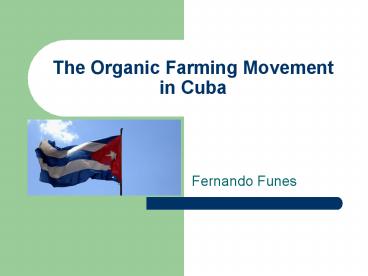The Organic Farming Movement in Cuba - PowerPoint PPT Presentation
1 / 18
Title:
The Organic Farming Movement in Cuba
Description:
Unsustainable intensive factory farming systems of cattle, poultry, and pig production ... 'agroecological Lighthouses' farms where agroecological concepts are ... – PowerPoint PPT presentation
Number of Views:227
Avg rating:3.0/5.0
Title: The Organic Farming Movement in Cuba
1
The Organic Farming Movement in Cuba
- Fernando Funes
2
Pre-Revolution Land Distribution
- 9.4 of the land-holders owned 73.3 of the land
- 85 of the farmers rented their land
- More than 4 million hectares left uncultivated on
large estates - 200,000 landless families
- Over half of the best agricultural lands lay in
the hands of foreign owners
3
Agriculture During the Revolutionary Period
- Land was distributed to more than 200,000 peasant
families - 70 of the latifundio lands were passed over to
the state control - Early daysemphasis in agricultural
diversification (nature-friendly) - but period tendencies pushed toward
conventional agriculture
4
Objectives of Revolutionary Agriculture
- To meet the food requirements of the population
- To generate export earnings
- To provide raw materials for industry
- To eradicate poverty and unsanitary conditions of
the countryside
5
Conventional Agricultural Problems
- Over-specialization, monocropping, and excessive
intensification - Excessive dependence on external inputs
- Large-scale deforestation
- Salinization, erosion, compaction, and fertility
loss of soils - Unsustainable intensive factory farming systems
of cattle, poultry, and pig production - Heavy rural-urban migration
6
Special Period in Cuba
- 1989Acute crisis began suddenly with the
collapse of the European socialist countries and
the disintegration of the Soviet Union - Prior to 1989more than 85 of Cuban trade was
with European socialist countries - --Little more than 10 with capitalist countries
- Cuba imported two-thirds of its food stuffs,
almost all of its fuel and 80 of its machinery
and spare parts from socialist countries
7
Effects of the Crisis
- Purchasing capacity was reduced to 40 percent
- Fuel importation reduced to a third
- Fertilizers reduced to 25 percent
- Pesticides to 40 percent
- Animal feed concentrates to 30 percent
- All agriculture seriously affected
8
Objective of Special Period Agr. Policy
- To shift to a low external input form of
agriculture, while at the same time boosting
production
9
Pillars for Transformation
- Scientific educational development
- Specialized institutions
- Specialized legislation
- Research
- Teaching
- Extension
- Productive practice
10
Structural Reorganization
- Decentralization of the state farm sector through
new organizational forms and production
structures - Land distribution to encourage production of
different crops in various regions of the country - Reduction of specialization in agricultural
production - Biological pest controls and biofertilizers
- Renewed use of animal traction
- gardening movementsurban,family, and community
- Farmers markets under supply and demand
conditions
11
(No Transcript)
12
(No Transcript)
13
Organic Farming
- 1970s and 1980sCuban scientists and farmers
started searching for alternatives to high input
agriculture - Many traditional practices were remembered
- agroecological Lighthousesfarms where
agroecological concepts are applied and which
promote sustainable production systems in
different regions - aimed at the production and marketing of
organic products - Collaborates with other organizations to
create education, research, and development
programs on sustainable agriculture
14
Why Cuba won the Alternative Nobel Prize
- Organic Fertilization and Soil Conservation
(manure, sugarcane filter-cake mud) - Ecological Management of Pests, Diseases weeds
(Biological control by using predators, insect
pathogens, and disease antagonists) - Crop rotation and polyculture
- Legume-based livestock systems, silvo-pastoral
systems, and integrated crop-livestock systems
15
Why Cuba won the Alternative Nobel Prize
- Ecological Soil Management
- Successful Organic Farming Experience
- Popularization of small rice production
- Medicinal plants
- Incipient organic development programs
- Organic fruit production
- Organic coffee and cocoa
16
Methodology
- Universities
- Farmer to farmer
- The Ministry of Science, Technology, and
Environment has given priority in recent years to
research in sustainable agriculture - Does not represent a change of technological
models, but of the very way in which we conceive
of agriculture - Considers the farmer as a cultural and not just
productive unit
17
Organics as an Alternative
- Its principles run counter to the vicious
globalization promoted by neo-liberalism, and are
more in favor of a socially just and solidarious,
more human globalization, without dependency on
transformation corporations and in favor of
self-sufficiency.
18
Favorable Conditions
- Strong demand for agricultural products
- Plenty of qualified personnel linked to
agricultural activities - Population experienced in community work
- Administrative and social structures that support
food self-sufficiency - Official mass media willing to sponsor publicity
campaigns for the peoples benefit - Research results that are compatible with the new
model - The return of many people to the countryside in
recent years - Organizations dedicated to the creation of an
agroecological culture































